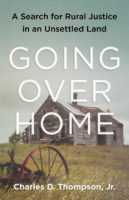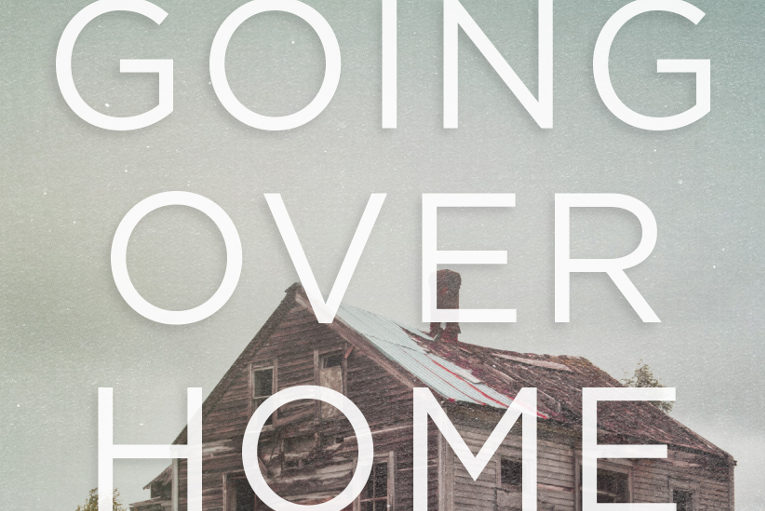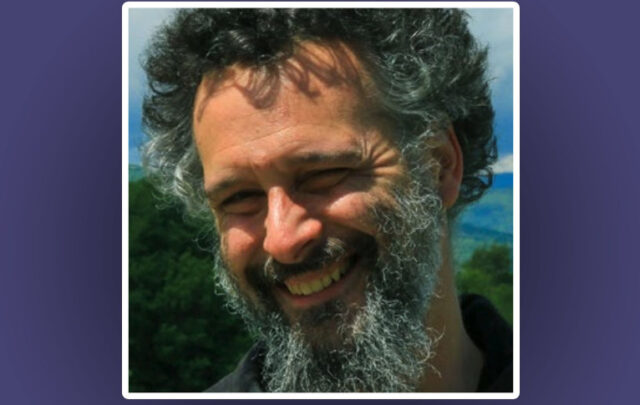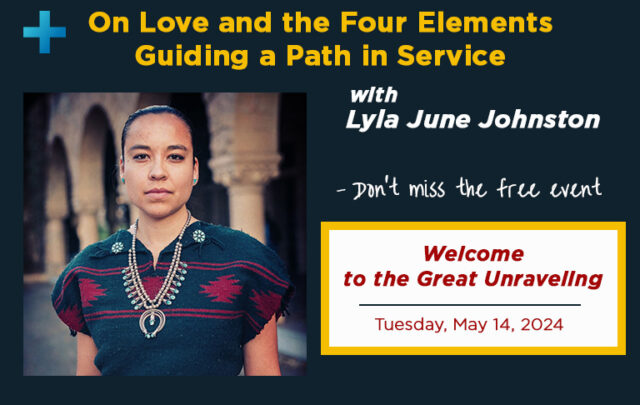 Going Over Home
Going Over Home
By Charles D. Thompson, Jr.
Charles Thompson came of age in southwestern Virginia and witnessed the demise of every farm in his family. Over the course of his own life of farming, rural education, organizing, activism, filmmaking, writing, and teaching, the stories of his home place have been his constant inspiration and continue to fuel his fight against rural injustices. His incisive new memoir, Going Over Home, deftly unpacks deep-seeded agricultural myths while addressing the history of racism and wealth inequality, and how all of it has come to bear on our nation’s rural places and their people today.
The following excerpt is from the epilogue of Going Over Home: A Search for Rural Justice in an Unsettled Land by Charles D. Thompson, Jr (Chelsea Green Publishing, October 2019) and is reprinted with permission from the publisher.
Covering
Covering—the simple process of pushing soil over seeds—is one of the most hopeful acts humans can engage in. Yet even as this word appears on my screen, it brings to mind the forty-three Ayotzinapa students of the Rural Teachers’ College who were killed in Iguala, Guerrero, Mexico, in 2014. The students had been studying to teach in rural elementary schools in Guerrero. Then, they participated in a protest against discriminatory hiring practices for teachers, and now they are dead.
In fighting to bring their children’s murderers to justice, the families and their supporters invoked the aphorism attributed to Greek poet Dinos Christianopoulos: “They tried to bury us, but they did not know we were seeds.” The families meant that, despite the atrocity, the justice and truth they stand for, like seeds buried beneath the ground, will sprout from the soil into the light, and bring change. Vowing to never forget the forty-three, the families say they will continue to echo the voices of their silenced young leaders, and indeed they have done so.
I met and talked with some of the family members of the murdered students when they came through Durham, North Carolina in March 2015, on their way to seek support from the US government in Washington, DC. When I heard them speak, I recognized immediately that their bravery and fighting spirit belonged to people of the land. Their willingness to risk their lives for justice was of the same resolve that I had witnessed often among the rural poor in Latin America and in the United States amid other struggles. Their use of the metaphor of seeds in Ayotzinapa succinctly captured the spirit I have tried to tap into when working for change in farming and in rural life in general—a spirit of hope that springs from agricultural regeneration.
But I must admit that my positivity about rural America has taken a beating recently, especially since 2016. In my lowest moments, I have wondered whether rural America still possesses a fighting spirit and whether our farm communities will be able to emerge from our failures and grow toward the justice and inclusion so many have worked for over the generations. Sometimes I have had to ask, do we in America still have a spirit of hope ready to sprout from our fallow ground? If they try to bury us, are we seeds?
We have heard ad infinitum that the result of the 2016 presidential election was due to rural Americans revolting at the voting booth. We have also heard incessantly that the kind of populism “rural Americans” espoused tied their hopes for a renewed rural economy to the vilification of Mexican immigrants, Blacks, Muslims, and seemingly just about anybody other than straight whites. Their nostalgia for America’s past sounded more like xenophobia than hope, more like spraying poisons than planting seeds for a new season. As these American “rural” voters helped usher in a new administration, it seemed fear rather than freedom had won the day, that Americans had begun believing that equality and participatory democracy are the problem rather than cherished ideals, that welcoming immigrants in a nation built by immigrants works against us, and that even taking care of the environment would somehow make America less powerful. Had a wall at our southern border really become for them a more apt symbol of our country than the torch held high by the Statue of Liberty? I worried that America was losing its identity as the home of the brave and free, and was fast becoming a bastion of the embittered and afraid who are willing to sell their very souls for personal and, by extension, corporate gain at the expense of the powerless.
Yet, a part of me also knows this is not the whole story. As in any society, there has always existed racism and a fear of difference in the United States. There have always been scapegoats. Yet thankfully there have also always been people in rural America who reject these tendencies. I believe this because I came of age in a place where rural Americans cared about neighbors, visited the shut-ins, rebuilt others’ burned barns, gave food to the needy, and showed up for each other when flood and fire struck. Rural people, including rural African Americans, indigenous peoples, Latinx people, and others, have embraced me, despite our different backgrounds and my naïveté. As a community organizer, I witnessed the spirit that some call the spirit of the Good Samaritan, which shows that love can overcome its enemies, fear and indifference. Today, the central question of that parable remains, even as it was written two thousand years ago: “Who is my neighbor?”
Are there rural Americans who will embrace neighbors who do not look like them, go beyond tribalism and fear, and welcome diverse allies in the struggle for common goals? Will rural whites come to see that their future is tied to racial, environmental, and economic justice for all? I believe the answers to these questions will determine whether our national drive to form a “more perfect union” can survive. Everything America stands for is riding on this.
For those who believe in the regeneration of seeds, much work lies ahead of us. In divided families and communities, we need people who are willing to listen to others, even when we may want to turn our backs and condemn. We also need those who will push back against intolerance. We need people who will join the oppressed in their fight for justice, knowing change will never come on its own, and that inequality will only worsen if we remain idle.
Believing in justice also means asking others with whom we may disagree to “please explain,” and to be willing to listen through misunderstandings. Successful communities cannot begin with condemnation or the dismissal of others. As hard as it may be, we must seek to understand the real pain in rural America that breeds the social cancers of racism and hatred of difference. I know from direct experience that the loss of good jobs is real, that coal communities and small manufacturing towns have suffered great harm, that farm communities have been battered beyond recognition, and that these wounds have made people turn against others in misguided back- lashes. When threatened, people can lash out and vilify others, and we know from many periods of history that the instinct to blame is the root of much tyranny in the world and that the powerful can use divisions to further amass power for themselves. To counteract such tendencies, we must seek to understand the roots of rural discontent. Leaders in communities must be courageous and stand against bigotry, and they must also listen for the pain, never in order to foment or use to their gain the hate that brews when people feel wronged, but to address the real losses that make citizens turn to rash judgments. Only when suffering people hear their worst fears repeated back to them in constructive ways can we hope for reconciliation and to find common ground.
The great challenge before us, whether in Appalachia, the rural South, or anyplace in the world, is to plant seeds of hope and change in soil that has been soured by anger and division. Transformation of this sort always begins with looking for an opening. To find one, we need active understanding, followed by constructive education and development of new opportunities. We need rural organizers who will stay for the long haul, believing in rural people, and believing that education and proper access to funding can help people solve their own problems. Above all, we must seek ways for people to hear one another across dividing lines.
I came from ancestors who were once marginalized people who experienced only glimmers of change. But from their descendants, I know that national efforts to empower those left out made my education possible, and that public investment led ultimately to my work for change within rural communities. Knowing this, I could never claim I did anything completely on my own. This assures me that others can benefit from public investment, too.
I know from experience that rebuilding of rural communities must include making federal agricultural credit available to young people. There is a resurgence of interest in local farming and we know that many are ready to volunteer on farms. How we respond to this new upsurge of interest and how we help transform these willing workers from glorified sharecroppers into farm owners is a key subject that will influence the very future of rural democracy in this nation. Will we provide grants and loans to foster this entrepreneurial spirit among our nation’s new farmers, including youths of color, who want to do the hard work of farming in the coming era of climate change? Providing them with means to landownership and food production is essential for reversing negative trends that have been decades in the making. Reducing environmental protections and unleashing corporate farming, coal mining, and other extractive industries—all strategies espoused by those who want to capitalize negatively on rural discontent—may bring a brief but fleeting boost to a few incomes in the short run. But abandoning protections cannot represent any hope for our collective future in the long run. Lashing out against other countries does no long-term good, either.
Our hope lies in embracing rural places as our homes, and treating them as beloved gardens we tend and are inspired by. These places can be where we raise children and take care of the elderly—home places are where we love neighbors as ourselves, not just those we choose, but, as Wendell Berry has said, the neighbors we have. Home is where we begin and end, and where we plant our seeds for the next generation. We all know there is much fallow ground waiting to be loved, and thankfully we still have many waiting to try. These hopeful people are also humanity’s eds waiting to sprout and grow. Let us nurture them with care.





